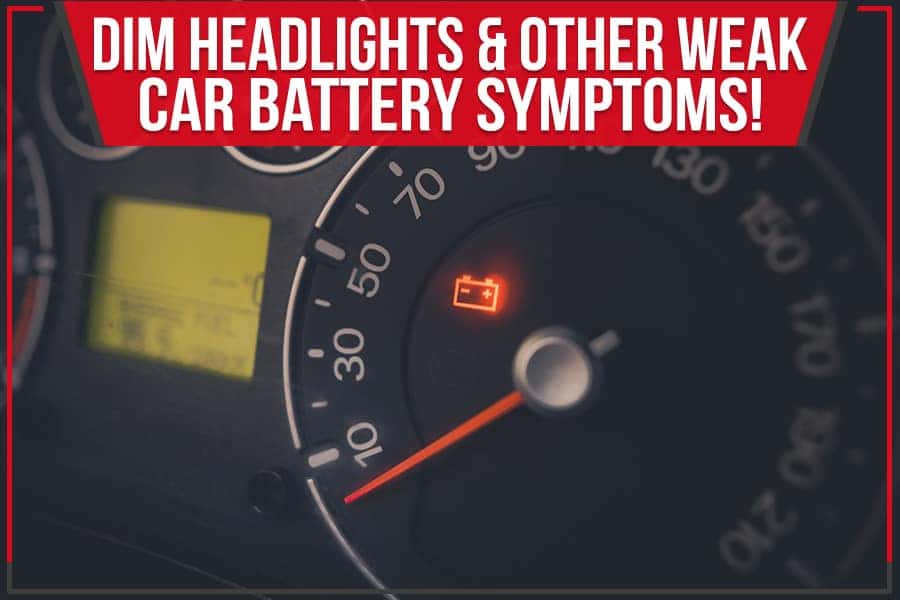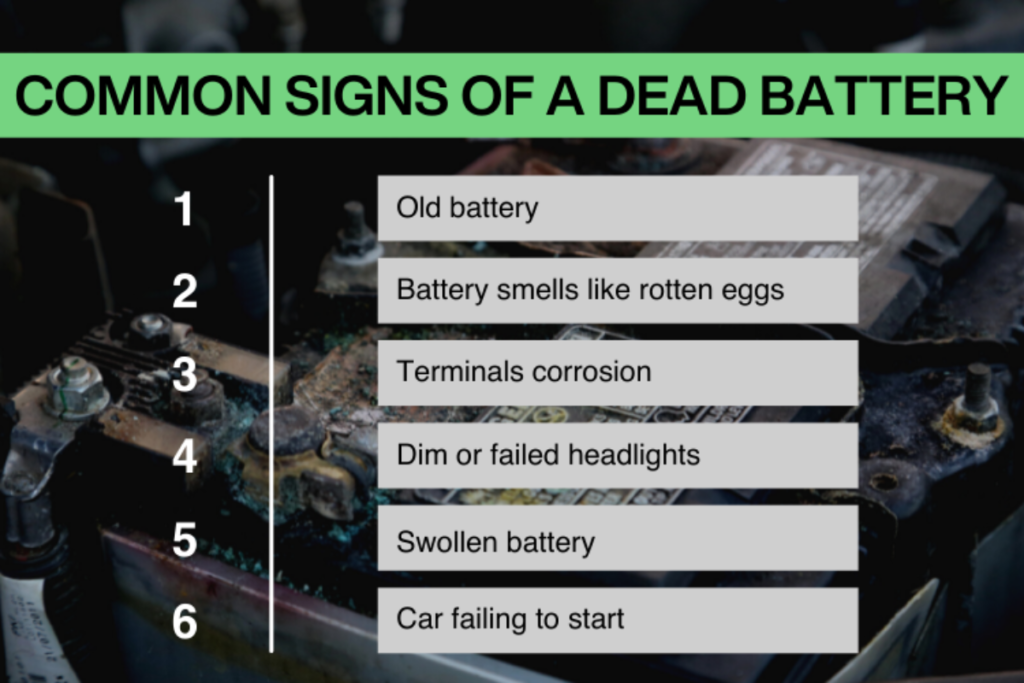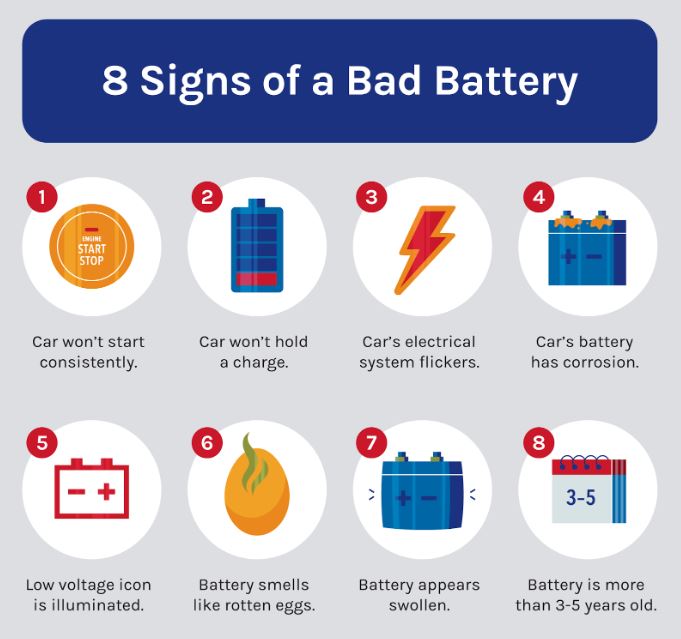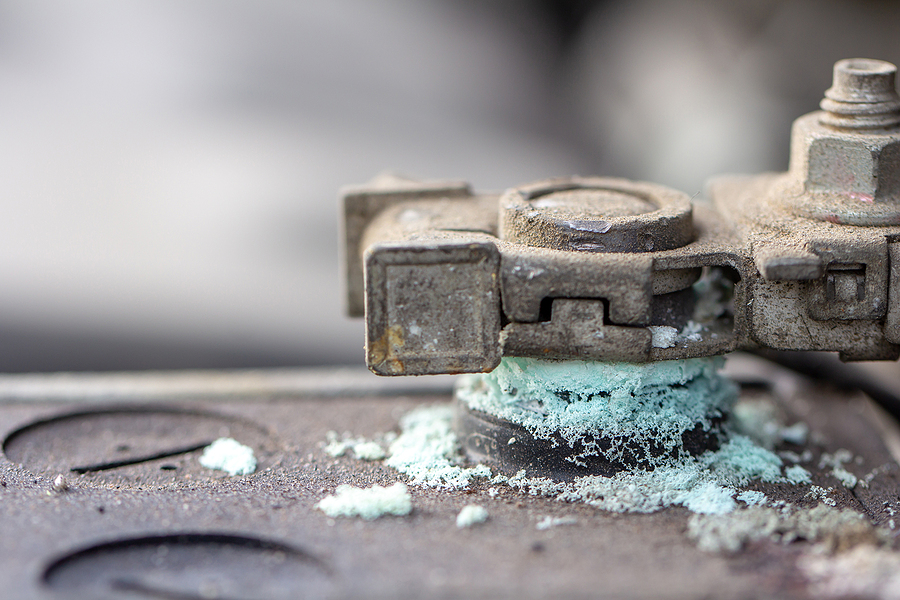Weak car battery symptoms include slow engine crank and dimming headlights. A struggling vehicle often signals a faltering battery.
Your vehicle’s heartbeat is its battery, powering up the engine and electronics. Spotting early signs of weakness can save you from a no-start disaster. Recognize the red flags: sluggish engine turnover, flickering dashboard lights, and a battery that’s beyond its prime.
A car that hesitates to start or has electrical issues may point to a battery losing its charge. Regular checks are crucial, especially if your battery is over three years old. A weak battery not only risks your immediate travel plans but can also strain other vehicle components. Stay ahead of potential failures and ensure your car remains reliable on every journey. Keep an ear out for that slow engine crank – it’s your first hint to take action.

Credit: www.toyotaofnewnan.com
Introduction To Car Battery Health
A car’s battery is like its heartbeat, essential for starting the engine and keeping everything running. Proper battery health ensures a smooth ride and reliability. It’s crucial to recognize the signs of a weak battery before it fails.
The Role Of The Battery
The battery powers your car’s electrical systems. It stores energy to start the engine and supports all electronic components when the engine is off. Without a healthy battery, your car may struggle to perform these basic functions.
Consequences Of A Weak Battery
- Difficulty starting the car: A clear sign the battery may be weak.
- Dim headlights: Lights may appear less bright, indicating low power.
- Electrical issues: Failing systems like radios or power windows signal battery problems.
- Slow engine crank: The engine takes longer to start, hinting at battery weakness.

Credit: www.carpages.ca
Dimming Headlights And Interior Lights
One clear sign of a weak car battery is Dimming Headlights and Interior Lights. This issue can make your car less safe. Let’s explore why this happens and its effects.
Correlation With Battery Strength
The strength of your car’s battery directly affects your lights. A strong battery means bright lights. A weak battery leads to dim lights. This is because the battery powers the lights. If the battery is low, it cannot provide enough power. This makes the lights dim.
- Bright lights = Strong battery
- Dim lights = Weak battery
Impact On Nighttime Visibility
Dim lights can make driving at night hard. It becomes tough to see the road. This can lead to accidents. It’s important to keep your battery strong. This ensures your lights are bright. Bright lights help you see clearly at night.
- Check your battery often.
- Replace the battery if it is weak.
- Keep your lights bright for safe driving at night.
Struggling Engine Start
One common sign of a weak car battery is a Struggling Engine Start. This happens when your car takes longer to start than usual. It’s like the car is trying very hard to wake up. Let’s dive into why this happens and how to spot it early.
Slow Crank Phenomenon
When your car battery gets weak, you might notice a Slow Crank Phenomenon. This means the engine turns over slowly and takes longer to start. It sounds like the car is groaning. This is a clear sign your battery might need a check-up or a change.
- The engine takes longer to start.
- The start sounds weak or sluggish.
How Battery Affects Ignition
The battery is key for starting your car. It sends power to the engine. With a weak battery, there’s not enough power. This makes starting the car hard. Think of it like trying to run with a heavy backpack. It’s much harder, right?
- Battery sends power to start the engine.
- Weak battery means less power. Hard to start the car.
Remember: A struggling start often means a weak battery. It’s like a warning. If your car takes longer to start, it’s time to check the battery.
Electrical Issues And Accessory Malfunctions
A weak car battery can lead to a host of electrical issues and accessory malfunctions. Vital components may struggle to perform or fail without proper power. Understanding these symptoms can prevent being stranded or facing costly repairs. Let’s explore how a weakened battery impacts your vehicle’s electrical accessories.
Effect On Infotainment Systems
Infotainment systems heavily rely on your car’s electrical system. Signs of a weak battery include:
- Slow response from touchscreens
- Erratic behavior such as random resets
- Complete failure to turn on
These systems draw significant power, and a failing battery can’t keep up with the demand.
Power Window And Locks Behavior
Power windows and locks are often the first to show signs of battery trouble. Look out for:
- Sluggish operation or uneven window movement
- Intermittent lock function, which may compromise security
- Unusual noises when using windows or locks
These issues suggest the battery is struggling to supply enough power.
Dashboard Warning Lights
When your car struggles to start, the dashboard may hold clues to the problem. Warning lights act as silent guardians, alerting you to your car’s health. A weak battery often triggers specific dashboard symbols. Know these signs to prevent being stranded with a dead battery.
Battery Alert Symbol
The battery alert symbol looks like a rectangle with plus and minus signs. If it lights up while driving, pay attention. It means your battery might not be charging right. This symbol is your first hint to check your battery before it fails.
Understanding The Check Engine Light
The check engine light can signal many issues, including a weak battery. Don’t ignore this light. A quick check can save you from bigger troubles. This light may flicker or stay steady. Both are calls to action to diagnose your car’s condition.
| Dashboard Light | What It Means |
|---|---|
| Battery Alert | Possible battery or charging system issue |
| Check Engine | Could indicate a weak battery among other problems |
- Dimming headlights and interior lights
- Power fluctuations
- Slow engine crank
Check these symptoms along with the warning lights. They help you understand battery health. A weak battery needs prompt attention. Take action early to keep your car reliable.

Credit: www.aaa.com
Swollen Battery Case
One clear sign of a weak car battery is a swollen battery case. This bulging issue often goes unnoticed but can lead to serious car troubles. Let’s understand what to look for and why it happens.
Identifying Physical Deformations
A regular check under the hood helps spot a swollen battery. Look for these signs:
- Battery sides that are not flat
- Top or bottom of the battery that does not sit level
- Case seams that appear stretched or split
A visual inspection can save you from unexpected breakdowns. Act immediately if you notice any swelling.
Causes Of Battery Swelling
Why does a battery swell? Several factors contribute to this issue:
| Cause | Effect on Battery |
|---|---|
| Overcharging | Leads to excess heat and gas buildup |
| Extreme temperatures | Causes internal parts to expand |
| Age | Old batteries lose shape over time |
Understanding these causes helps prevent battery swelling. Regular maintenance is key.
Weak Car Battery Symptoms vs. Alternator Problems
When your car starts acting up, it can be challenging to determine whether the issue lies with the battery or the alternator. Both components are essential for your vehicle’s electrical system, but they serve different functions
Weak Car Battery Symptoms
A car battery provides the necessary power to start your engine and run electrical components when the engine is off. Over time, lose their ability to hold a charge and batteries wear out. Here are some common signs of a weak car battery:
- Dim Headlights and Interior Lights: If your headlights and interior lights appear dimmer than usual, it might indicate a weak battery.
- Slow Engine Crank: A sluggish start or a slow cranking sound when you turn the key suggests the battery doesn’t have enough power.
- Clicking Sound When Turning the Key: Hearing a clicking noise when you try to start the car can be a sign that the battery is too weak to start the engine.
- Electrical Issues: Malfunctions with electrical components such as power windows, radio, or dashboard lights can point to a battery problem.
- Frequent Jump Starts: Needing to jump-start your car frequently is a clear indication that your battery might be nearing the end of its life
Alternator Problems
The alternator charges the battery while the engine is running and powers the electrical system. If the alternator is failing, it can lead to a variety of issues. Here are symptom mentioned:
- Battery Warning Light: If the battery warning light on your dashboard comes on, it’s often a sign of alternator trouble.
- Dim or Flickering Lights: While dim lights can also be a battery issue, flickering lights are more likely related to the alternator.
- Strange Noises: Hearing unusual sounds like whining or grinding could indicate a problem with the alternator bearings.
- Electrical Failures: Issues with power windows, seat warmers, or the radio can also signal alternator failure.
- Dead Battery: A faulty alternator can lead to a dead battery because it’s not being charged properly.
Key Differences
- Cause: A weak battery is due to age or poor maintenance, while alternator problems stem from a malfunction within the alternator itself.
- Symptoms Timing: Battery issues are most noticeable during startup, whereas alternator problems can occur while driving.
- Electrical Performance: Persistent electrical issues typically point to the alternator, whereas intermittent problems are more often related to the battery.
How to Diagnose
- Check the Battery Voltage: Use a multimeter to measure the battery voltage. A fully charged battery should read around 12.6 volts. If it’s below 12 volts, your battery is likely weak.
- Test the Alternator Output: With the engine running, measure the voltage at the battery terminals. It should be between 13.7 and 14.7 volts. Anything outside this range indicates alternator issues.
- Inspect for Corrosion: Check battery terminals for corrosion, which can affect performance and mimic battery problems.
- Professional Testing: For an accurate diagnosis, visit a mechanic who can perform load testing on the battery and check the alternator’s performance.
Understanding the differences between a weak car battery and alternator problems is crucial for maintaining your vehicle’s health. By recognizing the symptoms and conducting basic tests, you can address the right issue and keep your car running smoothly.
Preventive Measures And Maintenance Tips
Keeping your car’s battery in top condition is crucial. A weak battery can leave you stranded. But you can avoid this. Let’s explore some key preventive measures and maintenance tips.
Regular Check-ups
Regular battery inspections are a must. They help spot issues early. Aim for a check every six months. A professional can test the battery’s strength. They can also clean terminals and remove corrosion. This keeps your battery healthy.
Ensuring Longevity Of The Battery
Want your battery to last longer? Follow these tips:
- Keep it clean: Dirt and grease shorten a battery’s life. Wipe it regularly.
- Secure it properly: A loose battery vibrates. This can damage it. Make sure it’s tight.
- Avoid short trips: Short drives don’t charge the battery fully. Take longer drives sometimes.
- Turn off lights and accessories: Leaving them on can drain the battery. Always check before leaving the car.
Use these tips to avoid a dead battery. Your car will thank you.
Frequently Asked Questions
How To Know If The Car Battery Is Weak?
To determine if your car battery is weak, observe slow engine crank, dim headlights, and frequent need for jump starts. Check the battery’s age; most last 3-5 years. Use a multimeter to measure voltage; readings below 12. 6 volts indicate a weak battery.
How Do I Know If My Car Battery Needs Replacing?
Your car battery may need replacing if you experience slow engine crank, dim lights, or the check engine light turns on. Also, consider replacing it every 3-5 years.
What Happens To A Car When The Battery Is Weak?
A weak car battery can lead to starting problems, dim lights, slow engine crank, and erratic electrical functions. Regular battery checks can prevent these issues.
How To Know If A Battery Or Alternator Is Bad?
To determine if a battery or alternator is bad, observe your car’s electrical performance and check for dimming lights or slow engine crank. Use a multimeter to measure the battery’s voltage and the alternator’s output. Consistently low readings indicate a fault in one of these components.
Conclusion
Recognizing weak car battery symptoms is crucial for vehicle maintenance. Timely detection ensures you’re never stranded due to a failed start. Regular checks and understanding these signs can save you time and hassle. Take action at the first hint of battery weakness to keep your journeys smooth and uninterrupted.
Stay vigilant and drive safely.
